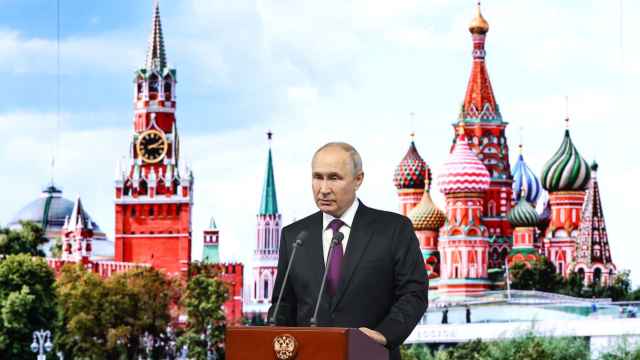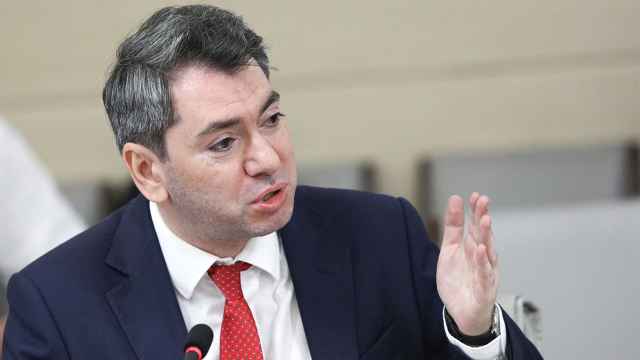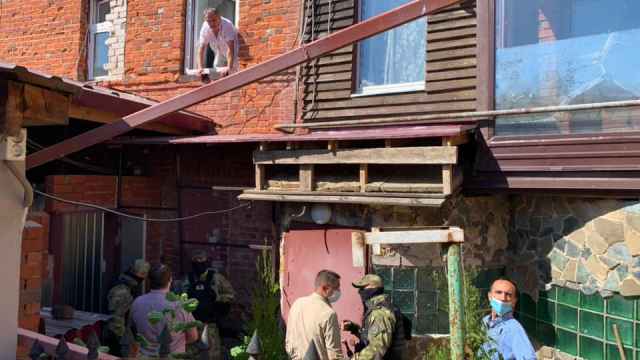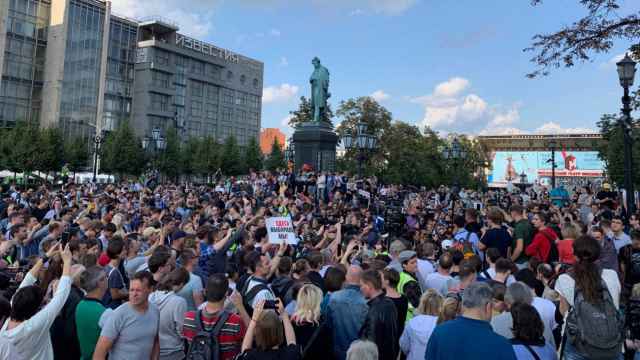The Golos (Voice) movement is the largest and most authoritative organization of electoral observers in Russia. On the morning of Aug. 17, a wave of searches was carried out at its members’ homes in Moscow and several other cities across the country, with police confiscating, their phones, computers and memory cards.
In the capital, Vladimir Zhilkin, a former instructor at Tambov State Technical University, was beaten while in detention. The police put him face down on the floor, struck several blows to the back of his head and stomped on his back.
Vladimir Yegorov, editor-in-chief of the online publication Vremya, was arrested and held for 15 days for "disobeying the police."
Grigory Melkonyants, co-chairman of Golos, was detained, and the next day arrested by Moscow’s Basmanny District Court, on charges of collaborating with an “undesirable” organization whose activities are banned in Russia. His lawyer says he could face six years in prison.
As the oldest monitoring organization in Russia, Golos provides expert analysis of election campaigns and voting, as well as train independent observers to record violations at polling stations. It is difficult to say which of these activities irritates the Russian authorities the most.
This is not the first time that Golos has faced pressure from the government. Throughout the organization’s two-decade-plus history, activists have been arrested and subjected to beatings, their houses have been searched, and more. This wave of searches is the fifth Golos activists have faced in recent years.
But never before has a criminal case been brought against the group’s leading figure. The charges against Melkonyants have no legal basis and are absurd.
He stands accused of taking part in the activities of the European Network of Election Monitoring Organizations, which is recognized as an undesirable organization. While it’s true that Golos was a member of the ENEMO, which unites similar election watchdogs in eastern Europe, it ceased all involvement in 2021, when the Justice Ministry banned the group. Golos released a statement about this at the time.
The ENEMO has never observed elections in Russia, nor has it ever made any public statements about the country's political processes. This still did not prevent the Justice Ministry from declaring them undesirable.
Russian authorities have been looking for a reason to block Golos’ activities for years. With its former affiliation with the ENEMO they found a convenient way to do it.
Melkonyants also stands accused of “engaging in political activities.” According to the investigation, these consist of the fact that he, as an invited expert, took part in events organized by Russia’s Central Election Commission to assess the possibility of using remote electronic voting. The political bias of Melkonyants’ arrest is beyond doubt, as confirmed by the Chairman of the State Duma Security Committee, Vasily Piskarev, who accused Golos’ reports of containing conclusions from “pseudo-experts in Russian electoral legislation” that holding fair elections in Russia was impossible.
On Sept. 10, regional and municipal elections will be held in Russia, in which more than half of eligible voters can take part. And in March 2024, presidential elections are due to take place, where Vladimir Putin will most likely run for his fifth term. Officials claim there is record support among the Russian people for the president's political agenda. But the reality is that before the start of the military campaign in Ukraine, Putin's rating had been falling for several years and nearly reached record lows.
Since the outbreak of the conflict and the adoption of a series of repressive laws that significantly restrict freedom of expression, it has become nearly impossible to obtain reliable opinion polling data. Moreover, it seems that the authorities firmly doubt that the picture of popular support for the Kremlin created by state propaganda reflects reality.
This is the true reason for the regular searches of Golos and the arrest of Melkonyants.
It explains why authorities are pushing to rapidly introduce electronic voting in regional elections — so they can assert near-total control over the results of the next presidential election. Unlike in-person voting, the integrity of the results from remote electronic voting cannot be monitored by outside observers. Pressure on volunteers who can record violations at polling stations is also mounting.
At the same time, it is worth noting that Melkonyants has never been a fierce critic of elections in Russia. He has always tried to engage authorities to help improve the system. He faced repeated criticism within the election observer community for doing this. Now, despite his moderate and highly restrained approach, he is in jail.
The arrest of Melkonyants and searches of Golos are certainly an attempt to block independent election monitoring in Russia. However, doing so is a pointless endeavour. Under Russian law, Golos had no legal right to send observers to polling stations, as only candidates and parties participating in elections may do so. Citizens go to observe polling stations because they feel it is their duty to safeguard the integrity of the electoral process, and have little tolerance for falsification. They will continue to do this regardless of whether or not any dedicated election monitor is present.
Perhaps increased pressure from the authorities will only embolden their view that election results in Russia completely contradict the will of the voters.
In the meantime, Russia’s community of experts who fight for free and fair elections will continue their work, regardless of the fate of Golos.
A Message from The Moscow Times:
Dear readers,
We are facing unprecedented challenges. Russia's Prosecutor General's Office has designated The Moscow Times as an "undesirable" organization, criminalizing our work and putting our staff at risk of prosecution. This follows our earlier unjust labeling as a "foreign agent."
These actions are direct attempts to silence independent journalism in Russia. The authorities claim our work "discredits the decisions of the Russian leadership." We see things differently: we strive to provide accurate, unbiased reporting on Russia.
We, the journalists of The Moscow Times, refuse to be silenced. But to continue our work, we need your help.
Your support, no matter how small, makes a world of difference. If you can, please support us monthly starting from just $2. It's quick to set up, and every contribution makes a significant impact.
By supporting The Moscow Times, you're defending open, independent journalism in the face of repression. Thank you for standing with us.
Remind me later.






